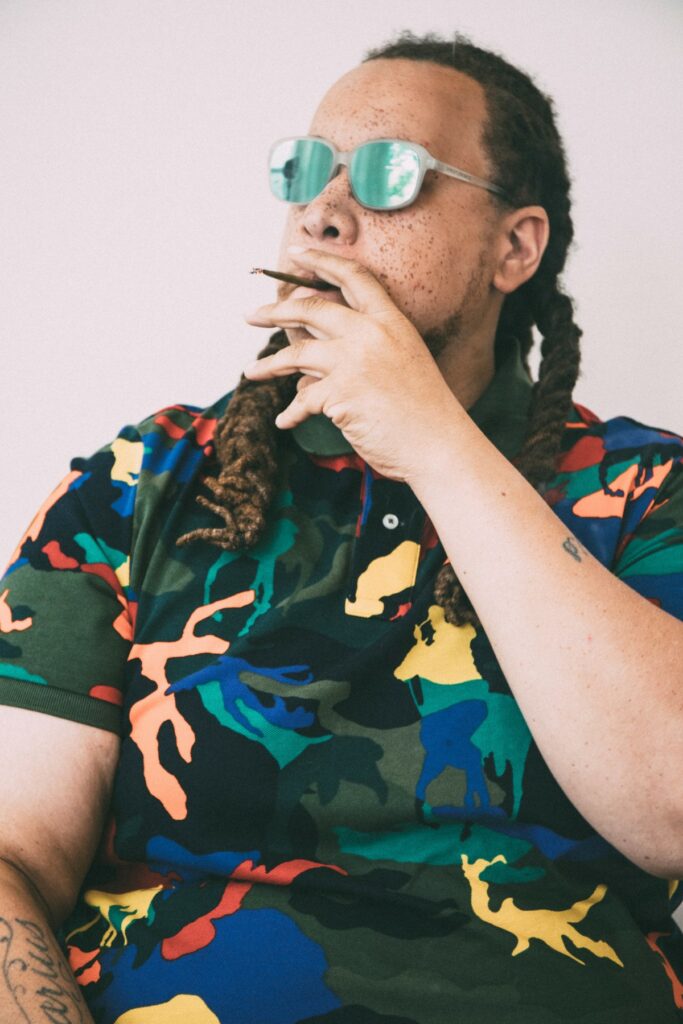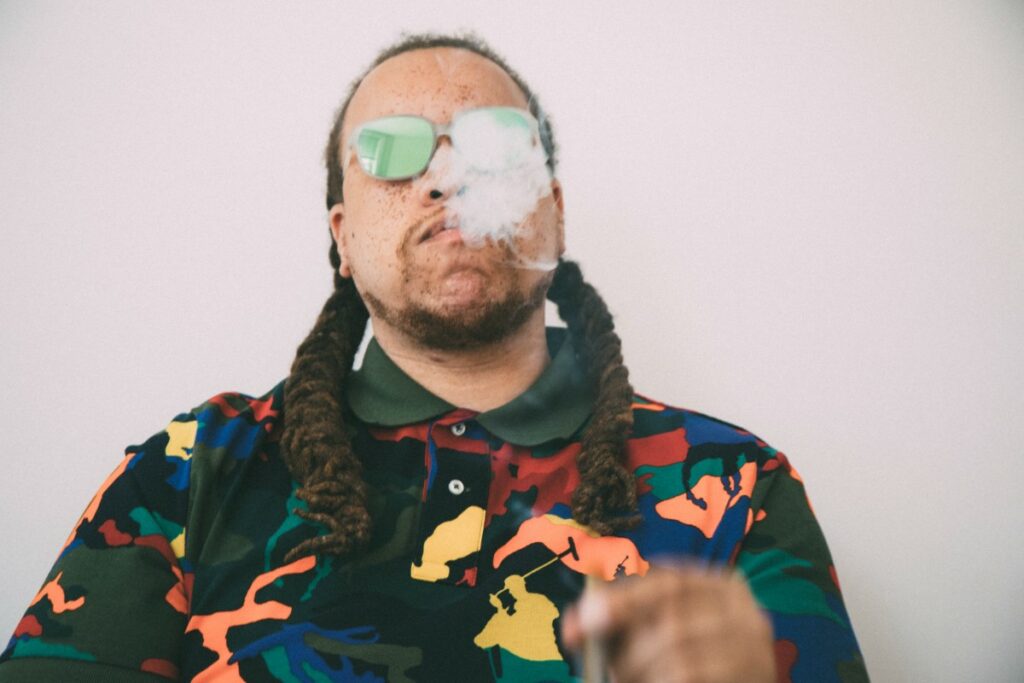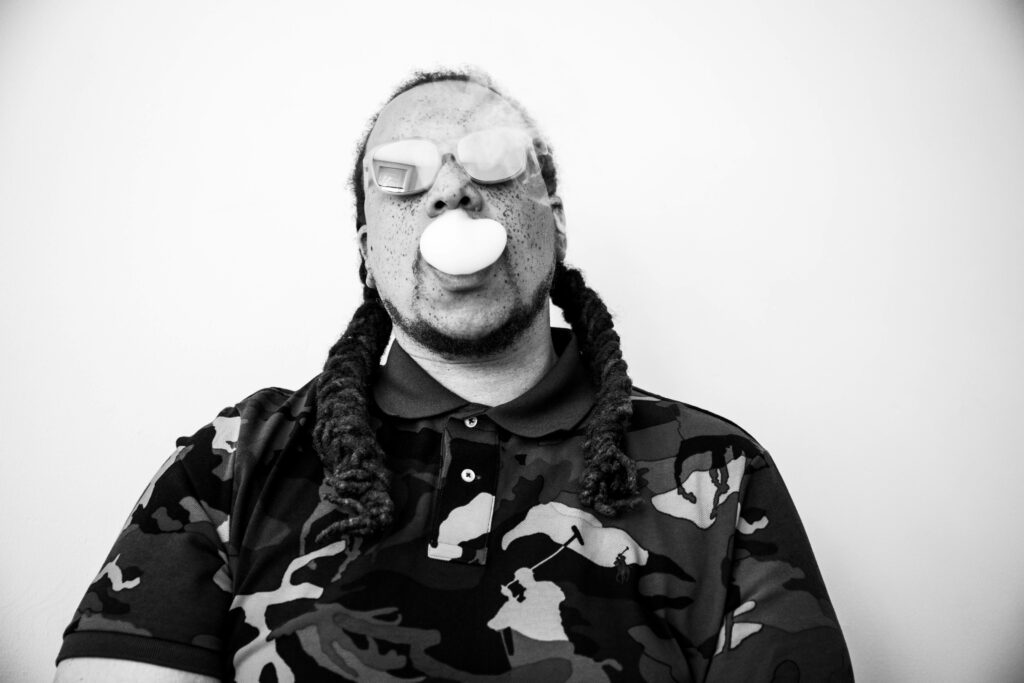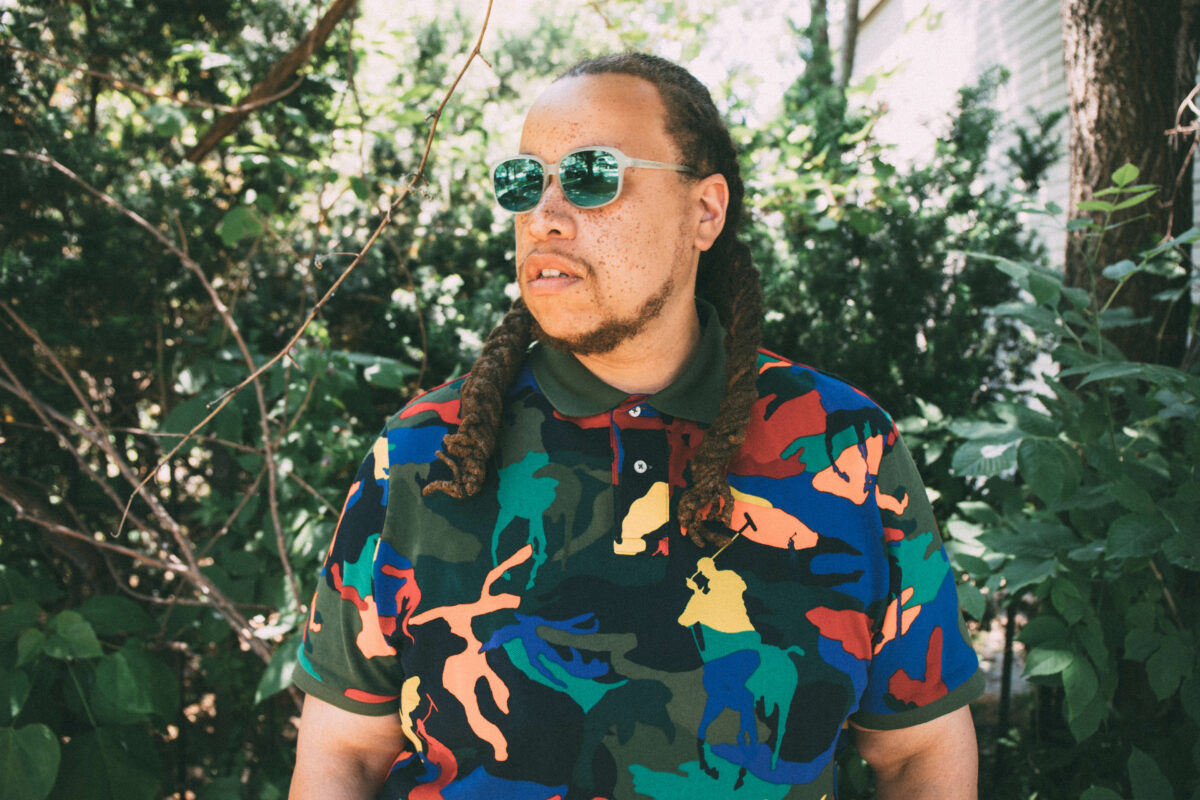DJ Hustlenomics is a presence that most people only experience once. He’s a recluse at times, very calculated, and as multifaceted as they come, with varying interests in music, technology, fashion, and cannabis. He is rarely seen or heard, but his impact is felt—people don’t realize that he helped launch the careers of prominent Chicago artists.
As a teenager, his natural talent and simply being at the right place at the right time led him to lend his voice and cosign artists who will be forever known as Chicago legends, solidifying his place in the history of drill music—a Chicago sound known for its gritty, violent lyrics over dark catchy beats.
In 2010, he was a typical sixteen-year-old Harlan High School student from Chatham who listened to his friends rap during class and in the lunchroom. After those same friends dubbed him “DJ Hustlenomics,” he began to navigate his way through the early days of “The Blog Era” by hosting mixtapes for notable Chicago artists at the time, such as S.Dot, Tink, and Chief Keef.
The Chief Keef era catapulted Hustlenomics into the limelight as one of Chicago’s most coveted mixtape DJs—almost every artist from Chicago wanted a cosign from him. As that wave ended and while dealing with his own personal struggles, something in Hustlenomics shifted, and he began to expand his creative empire.

South Side Weekly got a chance to sit down with DJ Hustlenomics and discuss his humble beginnings, the once-in-a-lifetime opportunity to help build Chief Keef’s career, his newer ventures in the fashion and technology space, and, of course, music.
This article has been edited for length and style.
SSW: You attended Harlan High School in their seventh and eighth grade program. What core experiences led you to create DJ Hustlenomics?
DJ Hustlenomics: I didn’t start getting into music until probably freshman year. I left Harlan after eighth grade because something in my brain was telling me I needed a change of environment, and Harlan wasn’t a school I thought I’d be in. I ended up not liking the school I was at; I didn’t know anybody, and it was far out west. It was a whole different genre of people, so to say, and I was out my comfort zone. And being young, you don’t really know how to adjust to that.
So I came back to Harlan sophomore year and my two friends, Iyon and Tone, happened to be rapping, doing their own thing. So I told myself, why not jump in? My pops has been a house [music] DJ all his life since he was the age I started [in highschool]. So it was kind of in me already, and I found my own lane with DJing and added my cosign to music, and that’s where everything started to blossom.
So with your friends Iyon and Tone, did you start hosting their mixtapes or projects first? How did you land into that?
It’s crazy, because I don’t think they even ended up dropping music. They dropped some music, but I wasn’t even fully DJ Hustlenomics yet. I still didn’t have a name for myself, I didn’t have an alias or anything. I kinda was just like, “Oh, y’all doing music? That’s pretty cool. Let me surround myself with y’all and see what I can do with this shit.” It’s kinda like they stopped rapping and I went all in with music. It’s a weird situation, but we all embraced each other and the paths we took with it.
What made you come up with the name Hustlenomics?
I actually didn’t come up with that name. An old highschool friend named LB came up with that name one day on Facebook. I don’t even remember if that was before we had physically met each other yet. People like Iyon and Tone were telling me that it was this dude that be freestyling in school and in the lunchroom. We ended up being friends on Facebook, and I remember asking for name suggestions. And that was his suggestion, and it’s been that ever since.
So when people ask you what does Hustlenomics mean, what’s the answer you typically give them? Like what does your name mean to you?
Well, over time, my name got shortened to Hustle, and I like that better. And that’s just what I do. No matter what I’m doing, it’s a hustle to it. I used to have T-shirts that said, “Can’t Knock The Hustle,” and for a little minute we sold t-shirts at school and around my neighborhood. It kind of embodies my personality. As life progressed, it really didn’t have a specific meaning when it first came to me, but as life went on and I accomplished tons of milestones, [hustle or hustlenomics] is the word version of my entire personality. If I don’t do nothing else, I’mma hustle, I’mma get to some money.
You are credited for working with a variety of artists, like Tink who is an R&B singer and, notably, Chief Keef, who is known for being the face of drill music. How did you get in tune with both? Is the rumor true that you discovered Chief Keef?
With Tink, I met her through someone who goes by Molly. She wasn’t a full-fledged manager, but she was one of those women who was helping Tink navigate her way through the music industry, helping her find studios, helping her make connections here and there. I knew Molly through a few of my people, and she was like, “Hustle, you should host Tink’s mixtape,” and it kind of came together from there. Tink thought I would never host her mixtape, and most people thought I was bigger than I was at the time. A lot of people were scared to approach me at the time and as for me—I was always like if I like what you got, let’s make something work. Let’s see where we go from there, and that’s how Tink happened.
With Keef, I didn’t discover him. I started messing with Keef when he was like sixteen, seventeen, and he had been making music on YouTube since he was like thirteen or fourteen, so I don’t think no one person discovered Keef. I will say that our mixtape blew everything up for him because it was surrounding a lot of controversy he had at the time for him. He got into an altercation with the police, and then he got out a few months later, everybody was making viral videos on WorldStar; and the mixtape had already been out, so everybody went back to that.
And then it was my viral random rants on mixtapes that kinda shed light on me. You have DJs like Drama, Holiday, and Scream who used to talk on mixtapes, but nobody ever heard it from a real Chicago perspective. I was shouting out different gangs; I was shouting out shit I didn’t even really know about, and that story in itself is crazy because me and Keef had connected through an artist named S.Dot, who I did like two or three mixtapes with, and Keef hit me up on Facebook like, “Yeah, you raw. I want you to do my shit.”
Two months passed, and he randomly hit me up one day while I was sick with strep throat, but he was rushing to get the project done. So I just went into my makeshift studio in my bedroom closet, and started rambling and that’s how “Bang” came about.
Was that the first mixtape you hosted for Keef?
Yeah, that was his first official project, his first official mixtape, which is why the rumor got started that I discovered him. It was DJs like DJ Amaris that was already in tune with Chief Keef. He was still a kid, though, and in the streets for real, so it was hard to get up with people musically when you’re doing stuff like that.
Did you ever anticipate that you and Keef’s career would take off in the way that it did?
Looking at where Keef is now and looking at all the things I’ve done over time, not at that time, no. This was a fresh sound, this is turnt, this is Chicago. It was just me cosigning it. I never knew that he would get into it with the police. And who’s to say if that chain of events didn’t happen, would he be even bigger? Everything that happened in Keef’s life is a part of his whole [upbringing]. So it’s like, nah, you wouldn’t of known. It was just having faith in another Chicago artist at the time.
With you being a natural born hustler, you eventually pivoted and shifted to other areas of entrepreneurship. A few years ago, you decided to cater to women with a clothing line called Hustle Honeyz. What inspired you to cater to women with that line?
Hustle Honeyz is a decades old collaborative idea that was brought to me by a former teacher who worked at [Gwendolyn] Brooks. The original idea he brought to me was, you know, you DJ, you DJ parties, you DJ events, you had something for artists, you need to have an entourage of women to be in the crowds promoting and passing out stuff. And over time, it just evolved.
I know so many women that do entrepreneurial things. In their career field, they just work hard. My mom works hard, my grandma still works, and I just know a ton of women who just do different stuff. So it just grew into an appreciative gesture or brand to just shine on women. Whatever you’re doing, you’re a Hustle Honey.

Do you foresee Hustle Honeyz growing beyond clothing? What would you like to see it evolve to?
I definitely want to see Hustle Honeyz grow into a brand or philosophy. I want to be able to grow the funds of the brand to do a lot of things for women, like open up women-only establishments, like it might be a Hustle Honeyz Nail Salon, or a full fledged spa. Anybody could come, but it would have perks for women that are low-income to make them feel they are deserving of the things people of a higher status may get. I want to sponsor women-led events and other women-built stuff. I definitely want a brand that’s surrounded by women and eventually controlled by women. I don’t want to control the brand, I just want to maintain the reputation.
Shifting back to the music, when people often talk about Chicago’s music scene and specifically the drill music scene, your name is often left out of the conversation. Does that make you feel slighted in any way?
Sometimes it does, but at the same time, the type of person I am and personality I have, it’s kind of like I shifted away from it at the right time. Most recently, I was in my audio-engineering phase working with the same type of artists, and it’s like the same things: they’re either gonna go with who’s convenient, or they switch up, or they just have a lot going on in the streets and it’s just inconsistent.
So I don’t see myself being around those types of artists long-term, if we’re being honest. I love working with them. I love the sound they bring to music. A lot of them have good energy, and a lot of them have good personalities in the studio. Regardless of the type of music they put out or the level of violence within that music, a lot of them are pretty cool people, but working long-term in business is just not my environment. I’m an introvert, so knowing I had to watch my back being a part of this entourage is just not really a big thing to me.
So to be slighted in conversations about who did what, everybody knows who did what at the end of the day. They can’t take away that I did Keef’s first mixtape; you can’t take away Winter’s Diary. People not even from Chicago still hit me up about that. Dreezy, other artists I’ve worked with. That stuff is solidified. So it’s not too much I can be salty about.
In what ways are you continuing to work with artists? Is it more on the audio engineering side or the A&R side?
I’d definitely say a little bit of both. I think 2017-2018 is when I really started audio engineering. I’ve been knowing how to do that my entire time in music since like 2011-2012, just by watching other people and using the same software they use to do my mixtapes as you do recording. But as the hosting died down and I just got back by myself—I lost a grandparent. I was trying to find my way back into music and audio engineering was a way for me to make money every day. I can be with the artist from phase one of the music creation, so that was my way back in and what I’ve been doing for the past five years now.
At one point, you went ghost and was very quiet on the music side. What was happening during that time period that made you stop?
A [romantic] relationship that came out of the blue, and that was a whole different everyday feeling of going to the studio and coming home drained. I got comfortable with that, and that was a part of me falling out of my connection with the music scene. A lot of it isn’t just artists leaving me out; a lot of it was me just removing myself from the equation. A lot of times I could have been in a studio session [but] I would rather be laid up because it was a lot more peaceful for me.
Then I lost my grandad, and he barely knew anything about this music. He didn’t know no damn Hustlenomics or anything, so that was a real sting to the heart because it’s like he passed randomly without him knowing about my accomplishments or anything. Then the next year, I lost my grandmother, so that was a double whammy. It was just a lot of times where I didn’t feel the need to share. I didn’t feel like I was going to be in the right space to be around artists and egos and stuff like that. Because if I was around those situations, I would quickly remove myself again, and that felt like wasted time to me.
After experiencing the losses of your grandparents and transitioning out of that relationship, what inspired you to get back to the things you enjoyed?
Just knowing I wasn’t average. During the duration of my relationship, I wouldn’t say that I burned bridges, but it was like certain stuff wasn’t worth the time, money, and headaches anymore. I stopped answering for certain artists. If it seemed like they weren’t trying to do anything real serious, I probably stopped answering for them. When the money slowed up on my entrepreneurship, I had to get a regular job, and that shit was so depressing. I was like, “If I was making X amount of dollars in one day or one week doing X amount of hours worth of work, then I’m not supposed to be here feeling like a robot, a machine.” That’s where engineering came in, because I was like, “What’s the best thing I could do to make money and feel like I’m locked back into the music scene?” So I started from there and started renting out studios.
If you had a time machine, do you think you would do anything differently in terms of your journey and career?
I would do a lot of things differently. It’s a lot of people that I connected with that I probably wouldn’t have. I’d definitely keep my name a little more rare. I feel like I made my name a little too in-house over that period of time. I definitely wouldn’t have took on so many projects, especially when the few projects and few artists that actually took off would’ve been enough, but you wouldn’t have known that. It seemed like everybody had potential back then. Definitely networking choices, definitely choosing when and when not to pop out. I definitely became a recluse a little too much.

What advice would you give DJs or entrepreneurs who have multiple passions on how to balance it all?
Definitely have some consistency. Or at least try it out and know if this is something you want to wake up to everyday. Right now, I’m learning what I’d rather wake up and do everyday, even if it’s seven different things a week. If I like waking up and spending twelve hours on this today, then cool, I’ll do this. I’m learning more of what to put my time and effort into.
If you are multipassionate like myself, definitely try to get your ten thousand hours in everything you want to do. If you wanna learn how to make T-shirts and build your own brand, get your ten thousand hours in and learn how to work heat presses, etc. If you want to learn how to make music, if you want to learn how to be a rapper or DJ, learn how to use the software and spend your ten thousand hours and focus on it.
What keeps you inspired?
Just wanting to be somebody and living comfortable at the end of it all. Just knowing where we grew up from on the South Side of Chicago, just seeing what happens when you don’t hold on to those inspirations, or if you don’t have any aspirations at all. Some people walk around with no inspirations at all, and we see what becomes of those people. Not to be super judgemental, but it’s like you have to have some type of passionate interest to keep you level headed these days and from falling into the wrong crowds. It’s also about wanting to provide for the people around me and wanting to see the people around me happy and enjoy life as well. Even though money shouldn’t be an issue, we gotta go to work and make money, so why not do something you love waking up to do everyday and share the fruits of your labor with the people you love and who supported you through it all?
What can we expect from you in this new decade?
I’m hoping to build my own brand for DJ Hustlenomics. For the past ten years, I was a cosign on everybody else’s brand. I cosigned Keef and Keef blew up, and he has Glo Gang. I want DJ Hustlenomics to be a powerhouse brand. If someone needs engineering for their whole album, they can come get it from the Hustlenomics Empire. If a woman is having a release party or throwing something for the kids, I want Hustle Honeyz to be part of it. So just building a personal brand for myself and not being attached to somebody that may not last or someone who may not give me the credit I deserve. Just building something that I know I can’t be discredited.
Follow DJ Hustlenomics on Instagram and Twitter @djhustlenomics for updates.
Kia Smith is a lover of words and digital storyteller. She previously wrote about Vicki Street for the Weekly. Keep up with her on Twitter and Instagram @KiaSmithWrites_.




Phenomenal interview and all of what Hustle said is Facts! I’m his Dad, he’s navigated gracefully through a lot of things that crippled many mentally! The best is yet to come!